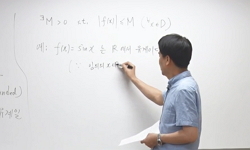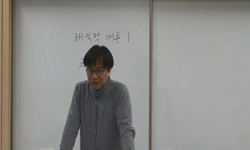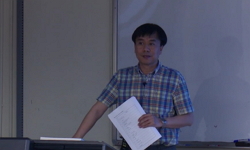설교는 명백히 인간의 말임에도 신학적 정의에 따라 하느님 말씀으로서 전제되고 간주된다. 설교의 신학적 정의는 설교행위를 통해 실제적으로 실현되지 않으면 역으로 오류와 남용의 빌미...
http://chineseinput.net/에서 pinyin(병음)방식으로 중국어를 변환할 수 있습니다.
변환된 중국어를 복사하여 사용하시면 됩니다.
- 中文 을 입력하시려면 zhongwen을 입력하시고 space를누르시면됩니다.
- 北京 을 입력하시려면 beijing을 입력하시고 space를 누르시면 됩니다.
https://www.riss.kr/link?id=A105360588
-
저자
한재동 (나사렛대학교)
- 발행기관
- 학술지명
- 권호사항
-
발행연도
2018
-
작성언어
Korean
-
주제어
시점 ; 하느님 말씀 ; 성례 ; 설교자 ; 해석학 ; 권위주의 ; 한국강단 ; Point of View ; Word of God ; Sacrament ; Preacher ; Hermeneutics ; Authoritarianism ; Korean Pulpit
-
등재정보
KCI등재
-
자료형태
학술저널
-
수록면
7-37(31쪽)
-
KCI 피인용횟수
5
- DOI식별코드
- 제공처
- 소장기관
-
0
상세조회 -
0
다운로드
부가정보
국문 초록 (Abstract)
설교는 명백히 인간의 말임에도 신학적 정의에 따라 하느님 말씀으로서 전제되고 간주된다. 설교의 신학적 정의는 설교행위를 통해 실제적으로 실현되지 않으면 역으로 오류와 남용의 빌미가 될 수 있다. 한국강단에서 발견되는 설교자의 부당한 권위주의가 그 오류와 남용의 한 예이다. 이는 인간의 말을 하느님의 말씀으로 강변하는 문제이기 때문에 심각하다. 하느님 말씀으로서 설교의 실현은 역설적으로 설교에서 인간 말의 위치와 역할을 성찰적으로 인식하고 의식적으로 명시하지 않으면 실현되지 않는다는 것이 본고의 신학적 논지이다. 설교에서 인간 말은 그 자체가 하느님 말씀에로 변형되는 것이 아니라 인간의 말 그대로 말씀이 임하고 드러나는 자리로서 사용된다. 즉 인간 말은 하느님 말씀을 위한 성례적 도구이다. 하느님 말씀이 설교에서 성례적으로 임하기 위해 인간의 말은 오히려 자신의 유한성과 연약성을 인식하고 명시해야 한다. 인간 말의 화자로서 설교자는 말씀의 직접적 채널이 아닌 제한적 해석자로서 말씀의 최종해석자인 청중의 일부여야 한다. 설교는 원천화자인 하느님 말씀과 최종해석자인 청중 사이의 해석학적 대화이기 때문이다. 이 대화에서 설교자의 위치는 하느님의 자리가 아니라 청중의 자리에 있다. 이는 해석자로서 설교자의 시점 문제를 통해 이해되고 실현된다는 것이 본고의 실천적 논지이다. 실천적 장에서 하느님 말씀과 인간 말 사이의 혼란과 남용은 시점의 혼란과 남용에 기인하기 때문이다.
다국어 초록 (Multilingual Abstract)
Preaching is apparently a human word, but is presupposed and regarded as God’s Word by theological definition. The theological definition on preaching may, contrary to its good will, be a pretext for fallacies and abuses if not actually realized thr...
Preaching is apparently a human word, but is presupposed and regarded as God’s Word by theological definition. The theological definition on preaching may, contrary to its good will, be a pretext for fallacies and abuses if not actually realized through preaching practice. A case of its fallacies and abuses is the unjustifiable authoritarianism observed in Korean pulpits. This is serious because it is to insist that the human word is the divine word. The theological claim of the study is that the realization of preaching as the Word of God is not possible paradoxically unless the locus and role of the human word in preaching is introspectively recognized and consciously manifested. The word of the human in preaching is not transformed to the Word of God, but as such is used as a site for the advent and disclosing of the divine word. That is, the human word is a sacramental instrument for the Word of God. The human word should rather recognize and uncover their limitedness and fragility in order that the Word of God come to happen sacramentally in preaching. The preacher as the human speaker in preaching must be a part of the audience as the final interpreter of the Word, not as a direct channel of it. For preaching is a hermeneutical dialogue between the Word of God as the ultimate source speaker and the congregational audience as the final interpreter. The locus of the preacher in this dialogue is not that of God but of the audience. The practical claim of the article is that the matter is understood and actualized in terms of the problem of the POV of preaching. For the confusions and abuses between the divine word and the human word in the practical level are caused by the confusions and abuses of POV.
목차 (Table of Contents)
- 초록
- I. 들어가는 말
- II. 원천적 화자, 도구적 화자, 그리고 대화참여자로서 청중
- III. 한국강단에서 설교자의 비성찰적 위치와 그에 대한 저항
- IV. 설교자의 고유한 위치의 성찰적 수립을 위한 단초와 방향
- 초록
- I. 들어가는 말
- II. 원천적 화자, 도구적 화자, 그리고 대화참여자로서 청중
- III. 한국강단에서 설교자의 비성찰적 위치와 그에 대한 저항
- IV. 설교자의 고유한 위치의 성찰적 수립을 위한 단초와 방향
- V. 설교자 시점 – 성례적 긴장 속 정직하고 겸손한 대화적 일인칭단수시점
- VI. 나가는 말
- 참고문헌
- Abstract
참고문헌 (Reference)
1 정장복, "한국교회의 설교학개론" 예배와 설교 아카데미 2001
2 한경국, "한국 최초의 설교집 백목강연에 대한 연구" 한국실천신학회 (54) : 145-173, 2017
3 김병석, "초기 한국장로교회 설교학 원리 연구 - Herrick Johnson의 ‘적응의 법’을 중심으로 -" 한국실천신학회 (51) : 111-139, 2016
4 정장면, "초기 기독교 선교사의 설교에 관한 연구" 한국복음주의실천신학회 20 : 287-315, 2009
5 계재광, "유교문화가 한국교회 리더십 형성에 미친 영향 - 유교의 권위주의 영향을 중심으로 -" 한국실천신학회 (22) : 77-106, 2010
6 김운용, "올곧은 삶으로 하늘의 뜻을 전한 저항의 설교자 은재 신석구 목사의 설교 사역에 대한 연구" 한국실천신학회 (58) : 145-172, 2018
7 이정순, "오순절주의의 특성과 신학적 의미" 한국실천신학회 (48) : 331-356, 2016
8 한재동, "예배 언어로서의 설교" 한국실천신학회 (42) : 199-235, 2014
9 류원렬, "아더 피어선(Arthur T. Pierson)의 사역과 설교 특징 연구 - 런던 스펄전 교회에서의 설교를 중심으로 -" 한국실천신학회 (32) : 337-368, 2012
10 박상환, "『中庸』에 나타난 物我一體의 世界觀" 간재학회 11 : 297-320, 2011
1 정장복, "한국교회의 설교학개론" 예배와 설교 아카데미 2001
2 한경국, "한국 최초의 설교집 백목강연에 대한 연구" 한국실천신학회 (54) : 145-173, 2017
3 김병석, "초기 한국장로교회 설교학 원리 연구 - Herrick Johnson의 ‘적응의 법’을 중심으로 -" 한국실천신학회 (51) : 111-139, 2016
4 정장면, "초기 기독교 선교사의 설교에 관한 연구" 한국복음주의실천신학회 20 : 287-315, 2009
5 계재광, "유교문화가 한국교회 리더십 형성에 미친 영향 - 유교의 권위주의 영향을 중심으로 -" 한국실천신학회 (22) : 77-106, 2010
6 김운용, "올곧은 삶으로 하늘의 뜻을 전한 저항의 설교자 은재 신석구 목사의 설교 사역에 대한 연구" 한국실천신학회 (58) : 145-172, 2018
7 이정순, "오순절주의의 특성과 신학적 의미" 한국실천신학회 (48) : 331-356, 2016
8 한재동, "예배 언어로서의 설교" 한국실천신학회 (42) : 199-235, 2014
9 류원렬, "아더 피어선(Arthur T. Pierson)의 사역과 설교 특징 연구 - 런던 스펄전 교회에서의 설교를 중심으로 -" 한국실천신학회 (32) : 337-368, 2012
10 박상환, "『中庸』에 나타난 物我一體의 世界觀" 간재학회 11 : 297-320, 2011
11 Gadamer, Hans-Georg, "Truth and Method" Bloomsbury Academic 2004
12 McClure, John S., "The Roundtable Pulpit: Where Leadership and Preaching Meet" Abingdon 1995
13 Sellnow, Deanna D., "The Rhetorical Power of Popular Culture: Considering Mediated Texts" Sage 2009
14 Brueggemann, Walter, "The Prophetic Imagination" Fortress 2001
15 Stott, John, "The Preacher's Portrait: Some New Testament Word" Wm. B. Eerdman 1988
16 Rasley, Alicia, "The Power Of Point Of View: Make Your Story Come To Life" Writer's Digest 2008
17 Callero, Peter L., "The Myth of Individualism: How Social Forces Shape Our Lives" Rowman & Littlefield 2017
18 Smith, Gordon T., "The Lord's Supper: Five Views" IVP 2008
19 Essex, Andrew, "The End of Advertising: Why It Had to Die, and the Creative Resurrection to Come" Spiegel & Grau 2017
20 Barnhart, Joe E., "The Billy Graham Religion" United Church Press 1972
21 Bloesch, Donald G., "Spirituality Old & New: Recovering Authentic Spiritual Life" IVP 2007
22 Heisler, Greg, "Spirit-Led Preaching: the Holy Spirit's Role in Sermon Preparation and Delivery" B&H Academic 2007
23 Rosscup, James E, "Rediscovering Expository Preaching" W Publishing 119-136, 1992
24 Braaten, Carl E., "Principles of Lutheran Theology" Augsburg Fortress 2006
25 Webb, Joseph M., "Preaching Without Notes" Abingdon 2001
26 Lloyd-Jones, Martyn, "Preaching & Preachers" Zondervan 1972
27 Craddock, Fred B., "Preaching" Abingdon 1985
28 Vines, Jerry, "Power in the Pulpit: How to Prepare and Deliver Expository Sermons" Moody 1999
29 Oden, Thomas C., "Pastoral Theology: Essentials of Ministry" HarperSanFrancisco 1983
30 Willimon, William H., "Pastor: the Theology and Practice of Ordained Ministry" Abingdon 2002
31 Jeter, Joseph, "One Gospel, Many Ears: Preaching for Different Listeners in the Congregation" Chalice 2002
32 Cornick, David, "Letting God Be God: the Reformed Tradition" Orbis 2008
33 Fiske, John, "Introduction to Communication Studies" Routledge 2010
34 Ricoeur, Paul, "Interpretation Theory: Discourse and the Surplus of Meaning" Texas Christian University 1976
35 Lipovetsky, Gilles, "Hypermodern Times" Polity 2005
36 Garner, Stephen Chapin, "Getting into Character: The Art of First-Person Narrative Preaching" Brazos 2008
37 Evelyn Underhill, "Essentials of Mysticism" Cosimo 2007
38 Gibbs, Eddie, "Emerging Churches: Creating Christian Community in Postmodern Cultures" Baker 2005
39 Barth, Karl, "Church Dogmatics" T&T Clark 1973
40 Thunberg, Lars, "Christian Spirituality: Origins to the Twelfth Century" Crossroad 291-311, 1985
41 Kress, Nancy, "Characters, Emotion & Viewpoint: Techniques and Exercises for Crafting Dynamic Characters and Effective Viewpoints" Writer's Digest 2005
42 Stott, John, "Between Two Worlds: The Challenge of Preaching Today" Eerdmans 1982
43 Heidegger, Martin, "Being and Time" Harper Perennial 2008
44 Overdorf, Daniel, "Applying the Sermon: How to Balance Biblical Integrity and Cultural Relevance" Kregel 2009
45 Burke, Kenneth, "A Rhetoric of Motiv" University of California 1969
46 Edwards, O. C. Jr, "A History of Preaching" Abingdon 2004
동일학술지(권/호) 다른 논문
-
헬무트 쉬비어(Helmut Schwier)의 설교학 연구
- 한국실천신학회
- 윤성민
- 2018
- KCI등재
-
강해설교의 방법론적 형태에 관한 연구 : 귀납법과 3단계의 적용
- 한국실천신학회
- 전창희
- 2018
- KCI등재
-
- 한국실천신학회
- 전요섭
- 2018
- KCI등재
-
- 한국실천신학회
- 박해정
- 2018
- KCI등재
분석정보
인용정보 인용지수 설명보기
학술지 이력
| 연월일 | 이력구분 | 이력상세 | 등재구분 |
|---|---|---|---|
| 2027 | 평가예정 | 재인증평가 신청대상 (재인증) | |
| 2021-01-01 | 평가 | 등재학술지 유지 (재인증) |  |
| 2018-01-01 | 평가 | 등재학술지 유지 (등재유지) |  |
| 2015-01-01 | 평가 | 등재학술지 유지 (등재유지) |  |
| 2013-01-01 | 평가 | 등재학술지 유지 (등재유지) |  |
| 2010-01-01 | 평가 | 등재학술지 선정 (등재후보2차) |  |
| 2009-01-01 | 평가 | 등재후보 1차 PASS (등재후보1차) |  |
| 2007-01-01 | 평가 | 등재후보학술지 선정 (신규평가) |  |
학술지 인용정보
| 기준연도 | WOS-KCI 통합IF(2년) | KCIF(2년) | KCIF(3년) |
|---|---|---|---|
| 2016 | 1.81 | 1.81 | 1.61 |
| KCIF(4년) | KCIF(5년) | 중심성지수(3년) | 즉시성지수 |
| 1.53 | 1.4 | 0.653 | 0.62 |




 eArticle
eArticle







